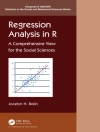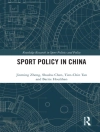Within the pages of this manual, students become personally involved in research as they learn important analytical, critical thinking, and communication skills, and develop the ability to interpret the contemporary global situation and its impact on their lives. Linking fundamental concepts of sociology with everyday activities, the exercises in each chapter lead students through an array of qualitative and quantitative methods as they test and apply theories. Students experience research as a process of asking questions, defining terms clearly, seeking patterns, and reaching conclusions based on their findings, while avoiding bias.
Short essays describing current perspectives on globalization accompany the exercises, addressing political, cultural, social, economic, technological, and religious dimensions.
Key Features
- 25 research exercises may be completed by students in class or independently, providing flexibility for the instructor.
- Exercises are ready to be assigned as they appear in the text, with convenient tear-out pages.
- Students investigate intriguing topics such as 'Global Ethics, ’ 'Violating Folkways, ’ 'Bowling Alone, ’ and 'Mc Donald′s Versus Jihad.’
- A variety of research methods are featured: interviews, experiments, functional analysis, content analysis, and more.
- Extensive follow-up 'Discussion’ sections help students maximize their understanding.
- Surveys and qualitative exercises adapted from larger studies allow students to compare their results with national and global patterns of results, which they may explore further through the Web links provided.
Intended Audience: This interactive manual follows the format of standard introductory sociology texts, making it an engaging and easy fit for Introductory Sociology or Principles of Sociology courses.
Spis treści
I. Globalization, Sociology and the Problem of Order
II. The Sociological Prism: The Action System
III. Stratification
IV. Institutions
V. Change
O autorze
Jo Ann Chirico, emerita, received her Ph.D. in sociology from the University of Pittsburgh.While originally a doctoral candidate in education, she found that sociology provided the theoreticaltools to analyze the problems she investigated—the coincidence of the global rise ofboth progressive and fundamentalist movements in education, religion, and other dimensions ofsocial life. Intrigued by Emile Durkheim’s pronouncement that individual differentiation wouldproceed to such an extent that all we ultimately would have in common was our humanity, shebegan her study of globalization—the integration of humanity into a social order.Most of her career was at the Beaver campus of Pennsylvania State University, where sheemphasized the importance of research and evidence, the global perspective, and civic engagementin her classes. She has presented workshops on internationalizing the curriculum andengaging students in service learning at conferences over the years.Her previous publications for SAGE include Sociological Research Exercises for the Global Age, a lab manual of mini research exercises for introductory sociology courses, and Globalization:Prospects and Problems.












